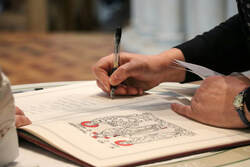 What do burst pipes and penmanship have to do with being chosen by God? There are two things I remember about my first Rite of Election as a catechumen. The first is the sound of rushing water at St. Mary’s Cathedral as the backdrop to the celebration. The Rite of Election normally takes place at the start of Lent, the period of the liturgical year that helps Christians prepare to reaffirm their baptismal promises at Easter. In this particular year, the sound of the water came from a pipe in the Cathedral that had burst due to cold weather! No doubt it was memorable for the Cathedral staff, but for me, it was a poignant foreshadowing of the baptism I was preparing to undertake at Easter as a member of the elect, one chosen by God to receive the sacraments of initiation. The second thing that I remember is inscribing my name in the book of the elect, in the rite of enrollment of names. These two things are the namesake of this liturgy, the Rite of Election and Enrolment of Names. Rite of Election The Rite of Election is about being chosen by God to be a disciple of Jesus Christ. In this ritual, the Church chooses those who have the dispositions that make them fit to take part in the sacraments of initiation. Before the Rite of Election the priests, deacons, catechists, godparents, and the entire community arrive at a judgement about the catechumens’ formation and progress in the Christian life. In the liturgy, they present the catechumens by name to the bishop and the entire assembly and give testimony about the catechumens’ readiness. The catechumens then express personally their intention to receive the sacraments of initiation and live as missionary disciples. Enrolment of Names With these testimonies, the bishop accepts the judgement of the Church and invites the catechumens to offer their names for enrolment. One by one the catechumens inscribe their names as a pledge of fidelity in the book that lists those who have been chosen for initiation: the Book of the Elect. Once the catechumens have inscribed their names, the bishop declares the Church’s approval of the catechumens saying: I now declare you to be members of the elect, to be initiated into the sacred mysteries at the next Easter Vigil. From this day until they receive the sacraments of initiation those who were catechumens are now called “the elect”. Historically they have also been called competentes or co-petitioners because together, they are asking for the sacraments and the gift of the Holy Spirit. They have also been referred to as illuminandi, those who will be enlightened, because in their baptism they will be filled with the light of faith. Holy Season of Lent The period between the Rite of Election and the Easter Vigil is known as the Period of Purification and Enlightenment. It is to be a time of intense spiritual preparation for the elect. The time for catechesis has ended, so the elect now join with the entire Christian community in fruitfully employing the Lenten season to prepare for Easter. The readings, music, and prayers for the Rite of Election are generally taken from the First Sunday of Lent. The bishop urges the godparents and the entire community to be an example and support for the elect during this time and then they are surrounded by prayer before being dismissed to “set out with us on the road that leads to the glory of Easter.” The Grace of Baptism As for those already baptized who are planning to make a profession of faith and/or complete their initiation at the Easter Vigil, they have already been made ready for discipleship through the dignity and grace of their baptism. These Christians have already been chosen or elected; they cannot be chosen again. Becoming Catholic is an expression of God’s choice and a choice of the individual, but it is not a new choice by God. The community of faith recognizes their desire to be sealed with the gift of the Holy Spirit and take their place at the Lord’s table. At this time, they affirm their readiness to more fully express their election by God that took place at their baptism. Then, with the whole Christian community, they join in uniting themselves more closely to Christ and coming to know in a deeper way the power of his resurrection in us during this holy season of Lent. Written by Dr. Simone Brosig, Liturgy Consultant / Director
0 Comments
Your comment will be posted after it is approved.
Leave a Reply. |
Author
Catholic Pastoral Centre Staff and Guest Writers Archives
July 2024
Categories
All
|
 RSS Feed
RSS Feed